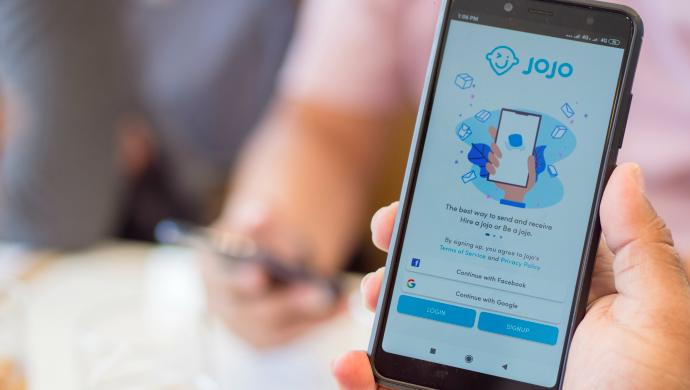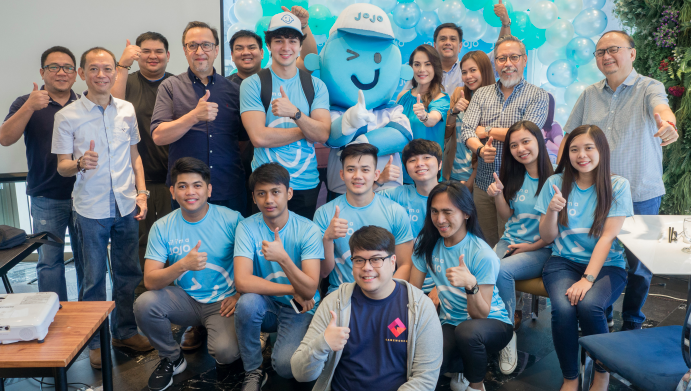Jojo is a delivery app that connects those who want to send their shipments with transporters already heading towards the direction of the package

It is extremely stressful to sit and spend our precious time inside the car, or even public transport, while stuck in road traffic. All along the journey, we keep cursing the governments and their short-sighted policies for the traffic mess (after all, what else can we do in the middle of the streets?).
However, people in the Philippines, especially those living in Manila and Metro Manila, are long used to it. They have adjusted their lifestyle to the every day traffic situation (during peak hours, it takes an average of one and a half hours to cover even a relatively short distance of 10 kilometres inside the city).
A group of smart entrepreneurs found a way to convert this traffic snarl into a money-making business — not just for itself, but for commuters, too. In the process, it converts every commuter in the city into entrepreneurs.
“An average Filipino spends one hour and six minutes on the road each day, wasting 16 days of their precious time per year. If I earned for every kilometre spent in horrible traffic during my daily commute, that would have made it much more bearable, not to mention profitable,” says Jay Fajardo, Chief Strategy Officer of Jojo, a courier crowdshipping app that helps commuters/motorists earn additional income.
Jojo calls itself a ‘Pasabay’ delivery app that connects those who want to send their packages/shipments (documents you need ASAP and items you shop for and want to be delivered the same day) with transporters already heading towards the direction of the package (‘Pasabay’ in local lingo means ‘ride with you’).
As a customer, you don’t need to clear your schedule just to send a package. When you make the booking, the Jojo transporter can meet you at the location of your choice and convenience. As long as your legal package fits within the standard large backpack, you can send it to anywhere in Metro Manila. With Jojo’s advanced GPS tracking system, you’ll get the exact location of your package at a single click.
“For senders, we ensure fast and secure shipping with real-time tracking features, and an access to a verified pool of transporters, whereas for Transporters, we are providing a convenient side-gig since they are delivering items on the way anyway,” says Fajardo.
“With traffic congestion getting worse, daily commuters are actually an invisible and untapped logistics and supply chain that can be used to help aid the growing and thriving e-commerce industry. It’s a more efficient and sustainable way to ship,” according to Eunice San Miguel, Marketing Manager of Jojo.
During the testing period, items can be delivered in as fast as 45 minutes within Metro Manila through a motorcycle, claims the company. “However, we cannot specify the time due to changing traffic conditions but what we guarantee is same-day delivery,” says Fajardo.
The platform will also allow the sender to be able to choose among three modes of transportation: commuter, motorcycle, and vehicle. The commuter might be the slowest due to traffic conditions but it is the cheapest. Motorcycle is mid-priced and is the fastest. Vehicles are the most expensive but it can carry a bigger load. So it really depends on what the sender needs, and the platform has the flexibility to address that, says the startup.
In the event that the recipient is unavailable to receive the package, two things can be done: He/she may give the 4-digit code to the person who will receive the package on his/her behalf. From there, this will be given to the transporter, who will end the transaction. If no one is available to receive, the package will be sent to Jojo’s headquarters in Makati and succeeding dispatch will be in the account of the sender/recipient.
Also Read: Breaking down how Grab is doubling-down on its financial product
The shipping starts at Php99 for the first three kms, and then at Php8 for every additional kilometre.
Delivery guaranteed
According to Jojo, transporter applicants are properly vetted before they become verified transporters. To be a transporter, he/she must submit two government IDs (one of which should be the driver’s license if planning to transport using a motorcycle). Likewise, he/she must submit an updated National Bureau of Investigation (NBI) /police clearance, or CR of the motor vehicle, sketch of permanent residence and authorisation letter of the motor vehicle, if not owned.

The transporter must also attend a seminar/briefing on requirements, rights, duties and obligations of a transporter to be scheduled by Jojo from time to time. Failure to attend will result in not being admitted, suspended or deactivated as a transporter.
“We do this rigorous procedure to ensure that items will be in the secured hands of a Jojo transporter. During the app usage, the sender will also see a photo of the Jojo transporter, as well as his/her rating. The sender will also be able to track the transporter during the transaction through our real-time GPS tracking,” Fajardo elaborates.
The company has also employed a mechanism to ensure it doesn’t transport illegal/contraband items. “Jojo transporters are independent contractors and are aware of their responsibility to diligently check items to be delivered. The transporter may refuse to pick up and/or deliver the goods that are not packed in his/her presence, or when the sender (or the person handing the goods to Jojo) refuses to open the packaging for inspection,” he clarifies.
The company is also particular about data protection, as it only keeps a minimum amount of information of senders/transporters required to be able to deliver the needed transaction. There’s also no third party sharing of information.
Jojo aims to clock 18,000 downloads during the first month of operations.
Growing e-commerce
E-commerce is growing steadily in the Philippines with a revenue of US$840 million in 2018 and is growing at an average of 12 per cent a year. This has paved the way for shipping and fulfilment companies to enter and serve this market need.
However, despite the growth in the country’s logistics industry, overall customer satisfaction remains low. “With a crowdshipping model, Jojo will answer the consumer pain points on reliability (available supply of transporters) and time/speed since we are tapping transporters who are heading to your package’s drop-off point already,” Miguel explains.
Also Read: The Philippines rejects Go-Jek’s appeal for ride-hailing licence
However, certain challenges remain, adds Miguel. “As it is with any two-sided marketplace, the biggest challenge is to balance the two user segments — our senders and transporters. We have to make sure that the needs of both segments are fulfilled: the senders to have a steady access to a pool of transporters, and for our transporters, that there are enough senders to make them stay with the platform.”
How Jojo aims to differentiate itself from other courier apps like Grab Express and Lalamove?
“Jojo is a crowdshipping platform. We allow everyday people who are commuters to become your transporters. Also, since transporters are on their way with point-to-point delivery, item arrives fast and transporters have the ability to cover last-mile, even inner barangays,” says Fajardo.
Jojo is one of Metro Manila-based First Shoshin Solutions’s projects, a tech startup which aims to develop platforms to address everyday concerns. Bootstrapped so far, the company has plans to raise funds eventually to be able to scale the product.
The post This Filipino startup turns your traffic stress into money appeared first on e27.